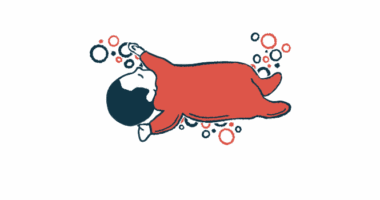Hi, PH. Yes, I’m Aware You’re Stressful.

There’s a scene in Disney’s classic animated film “Aladdin” in which the evil sorcerer Jafar transforms into a snake and squeezes Aladdin within an inch of his life. As a kid, I found this scene rather frightening. As an adult living with a serious chronic illness and respiratory disease, I can’t shake that snake imagery when I think about how it feels to be stressed.
Stress is universal. While some of us experience it more often than others, and some of us might have found the tools and resources to manage it better, it seems like none of us are able to get beyond its grasp.
Many triggers sound the stress alarm in life. Before my pulmonary hypertension (PH) diagnosis, I often would feel stress from a busy job, an over-scheduled personal life, a tough conversation with a friend or loved one, or running late for an obligation. That’s not to exclude the stress that comes from the bright screens, smartphones, and other devices that are a looming presence from morning to night.
While I try to have a less stressful response to those situations, they haven’t gone away. In fact, living with PH has multiplied my triggers, and I’m trying to become more aware of when they make their presence known and how I manage the response.
Every organ system in the body has the ability to experience stress. Pulmonary hypertension is a rare disease that affects the heart and lungs, putting stress on our bodies and our organs. Stress feels at times painful, uncomfortable, even scary — just like a boa constrictor squeezing its prey.
The bodily stress of PH appears even when I exert myself performing basic tasks or chores. Making a bed, taking out the trash, folding laundry, or even commuting to work can put stress on the body.
Stress in the body can also trigger flare-ups of PH-related symptoms. If I’m doing something too quickly and my body needs to catch up and manage the stress it’s experiencing, it tells me through elevated heart rate, shortness of breath, and low oxygen saturation. If I’m listening, I will slow down and rest until my vitals have returned to my relative normal.
I’ve put my body through a lot over the years, sometimes knowingly taking it to places where it will feel an incredible amount of stress. There was a string of years, pre-diagnosis, when I would visit places of high elevation, often to spend time outdoors with the people I care about most. Too many times, those excursions would result in severe episodes of high-altitude pulmonary edema, which would put my body in a hospital bed for multiple days. I would tell myself at the time that I didn’t want to feel the stress of missing out on those experiences.
Staying on top of treatment programs and managing one’s care can also be stressful for many chronically ill people. I felt stressed recently while attempting to refill one of my regular prescriptions I use to treat PH. The red tape of prior authorization complicated and extended what should have been a simple refill process — without all the extra phone calls — to ensure I had reliable access to my daily medications.
Beyond prescription refills, remembering to take medication multiple times a day can be stressful, depending on what else is happening in a given day. The side effects of medications like prednisone put added stress on our bodies, as well as diuretics — a medication to help regulate fluid retention — that have potential to cause stress for our bladder when we just can’t find a bathroom.
Stress can be chronic, with the potential to exacerbate PH-related symptoms. In addition to physical strain on our body, stress can affect our emotional and mental health, as well.
Sometimes the stress of life with a chronic illness like PH feels isolating. It takes us away from our families, friends, or the activities we used to enjoy. This can bring out depression, anxiety, or anger.
Although it’s Stress Awareness Month, I don’t need a whole month to spotlight stress in my life. However, raising awareness does remind me that I’m still learning the more effective ways to shed the skin of my stress. I used to go running when I needed to decompress. Now, I’ll either cook something, read a book, or watch television with my partner.
You can’t properly manage PH if you’re not managing the associated stress, and every person will have an approach that works best for them. I want to take the time to relish the quiet moments of decompression because I never know when that slithery hiss of stress will squeeze me again.
Follow Mike on Twitter: @mnaple.
Note: Pulmonary Hypertension News is strictly a news and information website about the disease. It does not provide medical advice, diagnosis, or treatment. This content is not intended to be a substitute for professional medical advice, diagnosis, or treatment. Always seek the advice of your physician or other qualified health provider with any questions you may have regarding a medical condition. Never disregard professional medical advice or delay in seeking it because of something you have read on this website. The opinions expressed in this column are not those of Pulmonary Hypertension News or its parent company, Bionews, and are intended to spark discussion about issues pertaining to pulmonary hypertension.









Janet Ammann
Dear Mike, Thank you for this. I plan on sharing your article with my family in hopes it will help them understand me and my condition a little more.
It is hard for some to see me fine one minute and then completely exhausted in the next. At times it’s hard for me to understand myself.
Again, Thank you.